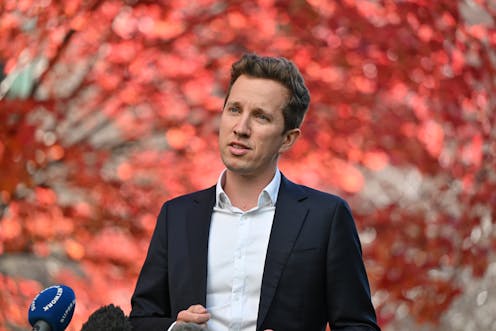
The government’s planned Housing Australia Future Fund has hit a roadblock.
Legislation for the $10 billion fund – the returns on which would be used to build social and affordable housing – is being blocked by an unusual alliance of the Coalition and the Greens.
Max Chandler-Mather, who won the seat of Griffith in Brisbane from Labor’s Terri Butler, has been under personal attack by the government. Labor leader in the Senate Penny Wong accused him of ego-stroking, and the prime minister suggested he was hypocritical for wanting more social housing while opposing a developments in his electorate.
Why is a party that has championed more social and affordable housing opposing an initiative to get more housing into the market?
In this podcast, Chandler-Mather says: “Our criticisms are twofold. The first is that Labor’s proposal as it stand, doesn’t guarantee a single cent for public and affordable housing and it does nothing for renters. Now Labor’s proposal is to get $10 billion of public money and rather than invest it directly in housing, they want to put it on the stock market via the Future Fund set up by Peter Costello, and only spend some of the returns on housing. Now the problem is that last year the Future Fund lost 1.2%, so the fund would have lost $120 million last year.
"You would not fund schools or hospitals via an uncertain gamble on the stock market and we’re much better off investing money directly in building public and affordable housing every year.”
The Greens are also pushing hard for a two-year national rent freeze, with a 2% cap set on increases after. They take inspiration from Scotland, which froze rent increases and Spain, which set a 3% cap. They don’t believe the criticism that rent freezes or caps will have a negative impact on the housing crisis.
“There is actually very little evidence to suggest that capping rent increases or controlling rents affects the supply […] the other broader point to make is that some commentators often, I would argue from the property developer lobby, will say, well, if we keep rents too low, then we won’t build enough houses. And to which I say, even if that were true, it’s not sustainable to have a housing system that will only build homes where rents start going up.
"That relies on having people having to suffer economic pain for us to get homes on the ground. And we know from around the world there’s a better way to do it.”
How would the Greens’ ambitious housing policy be paid for?
“There is easily enough money in the federal budget. One of the points we’ve made is that the biggest line item in this year’s federal budget, for instance, for housing is the tax concessions for property investors by negative gearing.
"The Parliamentary Budget Office found that those tax concessions to property investors are going to, [at] the end of the next ten years, cost the government over $20 billion a year.”
Chandler-Mather doesn’t buy into the argument from the Coalition that the projected 1.5 million net migration intake over the next five years will negatively affect the housing crisis, and believes it is sustainable.
“Migration has always made this country.
"I speak to a lot of people in my line of work, people in small businesses, aged care facilities or schools or all sorts of areas that need skilled labour, that say that there’s a shortage in Australia at the moment.
"It makes sense that we invite people in this country to set up their lives here.”
“But really, as always, in Australia, often it’s not a question of enough resources, it’s a question of how those resources are distributed.
"We could be much better fairly taxing large corporations in this country and using that wealth to build the public infrastructure, transport and housing that we need.
"I think often when the migration debate appears, it often distracts, I think, from the far more important debate, which is how we distribute resources daily in this country.”
Michelle Grattan does not work for, consult, own shares in or receive funding from any company or organisation that would benefit from this article, and has disclosed no relevant affiliations beyond their academic appointment.
This article was originally published on The Conversation. Read the original article.







